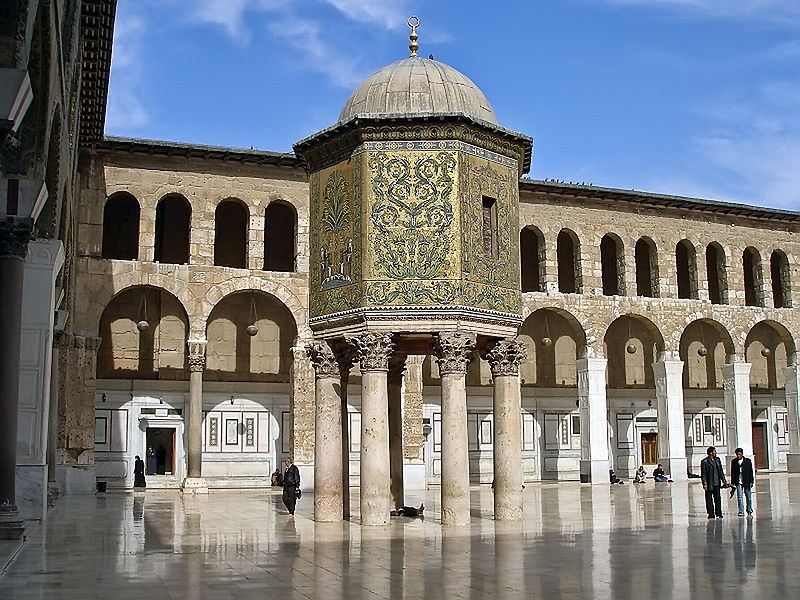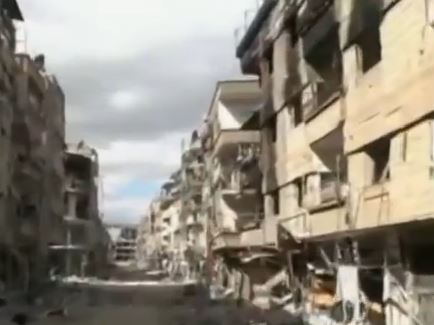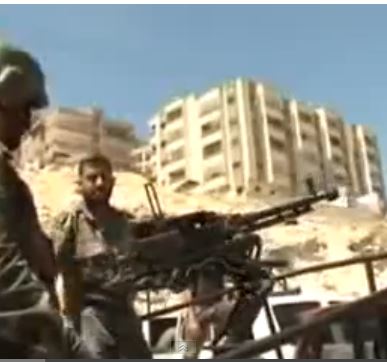Is Isaiah speaking to Syria today?
A prophesy given through the prophet Isaiah almost three thousand years ago carries an ominous message for the Syria and its capital.
by Watchman
 Let me say first of all that I struggle in concerned fashion with all the ‘prophets’ who are ‘out there’; each claiming a unique insight regarding what God is doing in relation to His revealed word. Let me say first of all that I struggle in concerned fashion with all the ‘prophets’ who are ‘out there’; each claiming a unique insight regarding what God is doing in relation to His revealed word.
I have lost track of the number of times every flare-up in the Middle East is trumpeted by someone or another as being the portent of the Gog/Magog conflict in Ezekiel’s prophesy (Chs. 38 and 39), while conveniently ignoring the fact that the fulfilment of that scenario requires Israel to have been in a settled peace (in ‘a land of unwalled villages’) for a considerable period of time (Ezek 38:11).
So it is with a fair degree of reluctance that I write now on the situation in Syria (and beyond). However, as the world waits in nervous expectation to see what retribution Obama might (or might not) visit upon President Assad and his regime it is surely a moment that calls for a re-reading of a chapter of Biblical prophecy.
Grand Mosque in Damascus
 The city of Damascus is the capital of Syria. It is a large prosperous city with modern amenities and an ancient history: it is also one of the oldest inhabited cities in the world. Founded by the Aramaeans over four thousand years ago it is a living depiction of human history. Yet today Damascus is dying. The city of Damascus is the capital of Syria. It is a large prosperous city with modern amenities and an ancient history: it is also one of the oldest inhabited cities in the world. Founded by the Aramaeans over four thousand years ago it is a living depiction of human history. Yet today Damascus is dying.
Two thousand seven hundred years ago Isaiah the prophet carried God’s word to the people then. Cascading down through history these words are with us today.
An oracle concerning Damascus:
"See, Damascus will no longer be a city but will become a heap of ruins. The cities of Aroer will be deserted and left to flocks, which will lie down, with no-one to make them afraid. The fortified city will disappear from Ephraim, and royal power from Damascus; the remnant of Aram will be like the glory of the Israelites," declares the LORD Almighty (Is. 17:1-3).
 What we are seeing in the civil war which is raging in Syria is the most complex of pictures. The lines of demarcation are multitudinous and blurred. They comprise a heady and eclectic mix of tribalism, political persuasions, religious affiliations, territorial ambitions, personal agendas and international allegiances and interests. [See 'Making sense of the Syrian crisis' - Ed.] What we are seeing in the civil war which is raging in Syria is the most complex of pictures. The lines of demarcation are multitudinous and blurred. They comprise a heady and eclectic mix of tribalism, political persuasions, religious affiliations, territorial ambitions, personal agendas and international allegiances and interests. [See 'Making sense of the Syrian crisis' - Ed.]
The present regime of the Alawite President al-Assad is fighting for survival while the perennial Sunni/Shia conflict is expressed within the range of countries – Iran, Saudi Arabia, Qatar – offering support to one side or another. Amidst it all, the major players – with the U.S. and Russia foremost – are fighting to defend their national interests and their prestige in the international community, while Iran and Turkey respectively look to maintain and expand their agendas within the region.
A few verses further on we read: “Oh, the raging of many nations-- they rage like the raging sea! Oh, the uproar of the peoples-- they roar like the roaring of great waters!” (Is. 17:12).
While Damascus was counquered by Tiglath Pileser when the Assyria king invaded in 734B.C. it has never been “taken away as a city” to become “a ruinous heap”: in fact it continued as an important city of the Assyrian empire. And even if it had been destroyed Biblical prophecy can often have more than one outworking. God’s word through Amos forewarned “the people of Aram [Syria] will go into exile in Kir [Jordan] (Amos 1:5). This would have been fulfilled as part of the aforementioned invasion, but what we are seeing today is exactly the same thing happening.
 Meanwhile, Jeremiah 49:23-27 states: Meanwhile, Jeremiah 49:23-27 states:
‘Concerning Damascus: "Hamath and Arpad are dismayed, for they have heard bad news. They are disheartened, troubled like the restless sea. Damascus has become feeble, she has turned to flee and panic has gripped her; anguish and pain have seized her, pain like that of a woman in labour.
Why has the city of renown not been abandoned, the town in which I delight? Surely, her young men will fall in the streets; all her soldiers will be silenced in that day," declares the Lord Almighty. “I will set fire to the walls of Damascus; it will consume the fortresses of Ben-Hadad” [the title of several Syrian kings].’
Israel also under serious threat
Continuing in Isaiah’s prophesy we read:
"In that day the glory of Jacob will fade; the fat of his body will waste away. It will be as when a reaper gathers the standing grain and harvests the grain with his arm-- as when a man gleans heads of grain in the Valley of Rephaim. Yet some gleanings will remain, as when an olive tree is beaten, leaving two or three olives on the topmost branches, four or five on the fruitful boughs," declares the Lord, the God of Israel (Is 17:46).
So the calamity is not confined to Syria: Israel will become very lean because of their failure to remain faithful to God (cf Is. 29:13). In the present volatility, UN peace-keeping troops – there since the Yom Kippur war of 1973 – are being withdrawn from the border separating Syria and Israel. So Israel is again very vulnerable; and the more so if the Iranian-supported Hezbollah in Lebanon or the Sunni forces in Syria acquire doomsday weaponry.
While the world waits for the US decision, the BBC's Jeremy Bowen reported from Damascus
"There’s a range of possibilities. If the Americans attack, and it’s big, that could give the armed rebels an edge they have never had. A small attack would allow the regime to claim a moral victory. No attack at all would also have an impact as it would change America’s standing in the region. Whatever happens American intervention in the war here pushes it into new and unknown territory."
But in all the turmoil and conflict we learn that when people and nations are brought to the end of themselves:
“In that day men will look to their Maker and turn their eyes to the Holy One of Israel” (Is. 17:7).
Ed footnote: See article ' Peter made the connection: we must do the same' which outlines the need for everyone of God's children to have a knowledge of God's word and an ability to understand current events through the prism of Scripture.
See left-hand margin for other 'Related Articles' on the situation in Syria.
|